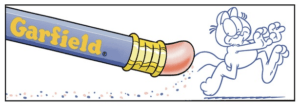An Academic’s Interpretation of Garfield
Skip to comments
Garfield © Paws, Inc and distributed by Andrews McMeel Syndication
If you think Garfield is just a gag-a-day comic strip you don’t know Garfield.
The Garfield comics reek of a dogmatic ideology. They formulate and endorse a brand of lazy cynicism that not only encourages readers to accept the status quo, but also frames the concept of going against it as imaginative and fantastical—in Garfield’s world, impossible. This is all the more frightening keeping in mind the comic’s enormous national circulation and lengthy career. The cemented place the strip has enjoyed within American culture speaks both to its palatability for national audiences and its ability to nicely coalesce with prevailing neoliberal capitalist ideology.
Nicole Collins, for Carleton College’s The Carletonian, explains the deeper significance of those gags in the world’s most widely distributed comic strip.
Three themes permeate the strip: impotent critiques of bureaucracy; friction and miscommunication with the State; and solipsism and marginalization of the Other.


Comments 3
Comments are closed.